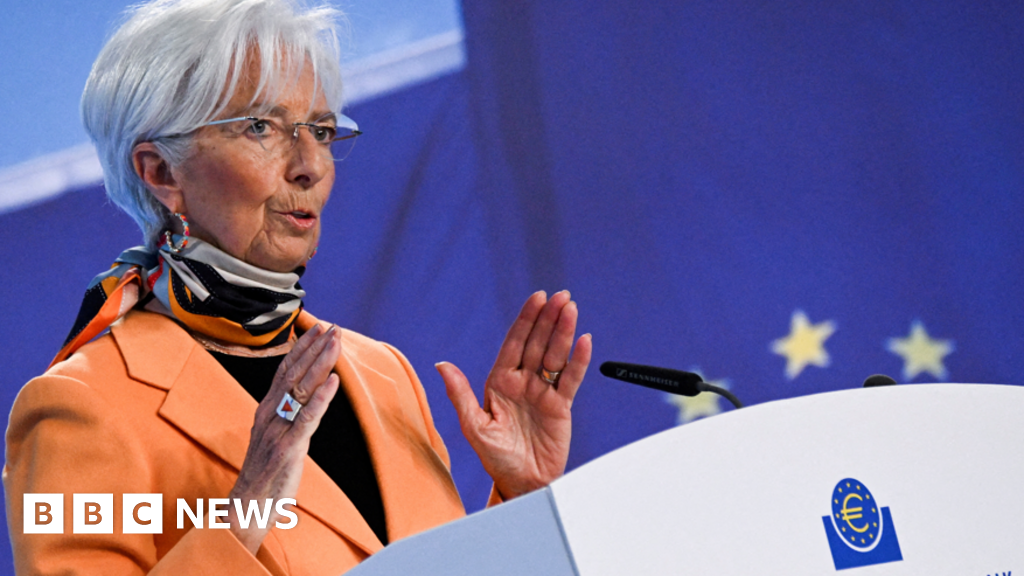ARTICLE AD BOX
By Kevin Peachey
Personal finance correspondent, BBC News
Customers are receiving details of how they will be affected
Householders are discovering the stark reality of rising energy bills as emails from suppliers reveal how much more they will pay from April.
Energy companies are required to send notices to their customers about an increase, stating in clear financial terms how much more they will pay.
Some are being told of a projected rise in their annual bill of well over £1,000.
Russia's invasion of Ukraine means a further bill shock in winter is likely.
About 26 million households in England, Wales and Scotland are on variable energy tariffs or prepayment meters governed by regulator Ofgem's price cap.
In April, a new cap means that a typical domestic energy bill will rise by about £700 a year, to around £2,000.
However, the actual amount paid still depends on how much energy is used in the home and, to a much lesser extent, on where the customer lives.
Regulations state that energy suppliers must notify their customers about price rises, and do so a "reasonable" amount of time in advance. The information should include the price increase, what it means for the customer financially, and when it takes effect. No marketing is allowed.
Those messages are starting to be sent out now ahead of the increase in April, with millions of people set to receive them in the coming days.
Individual projections show that those with relatively high amounts of energy use could be paying considerably more a year than they do now for gas and electricity.
The shock is clear on social media. Among some strong language, one customers said: "Serious choices on whether to heat my house or eat."
Another said: "God knows how people on lower incomes will afford these kind of hikes."
The bill shock is greater for those who were previously on much cheaper fixed deals with energy suppliers that have gone bust since the autumn. They were moved to variable deals with a new supplier.
One said she had been paying about £1,000 a year before the crisis, and had now received a projected annual bill of £3,000.
Frazer Scott, chief executive of Energy Action Scotland, said: "It will always come as a surprise to many people because the scale of the increases are so big."
There are currently no options available on the market to switch to a cheaper fixed tariff.
Shell Energy is among the first to be sending out notices.
"We want to be transparent about this, because many families will be worried about what this will mean for their finances, particularly when the prices of so many other goods and services are also rising," said a spokesman for the supplier, which is also offering help to vulnerable customers via its website.
Image source, Getty Images
About 70% of energy billpayers are charged via direct debit, with payments smoothed out across the year, so rising bills are not delayed until the winter. New, higher direct debit demands will feed through in the coming months. Prepayment meter customers will also see an immediate impact.
This will coincide with extra financial burdens on households including higher National Insurance payments and rising prices in the shops.
Citizens Advice said that it had seen more people visiting its help pages at the start of this year than at any other time during the pandemic, with particular interest in guides on help in paying energy bills.
The government has promised a council tax rebate for those living in bands A to D, covering about 80% of households, of £150. Another £200 will be taken off energy bills from October, but households will pay that back in instalments from 2023.
Another rise to come
The invasion of Ukraine by Russia has already pushed up the wholesale price of energy, and that will eventually be felt by households. While the UK gets less than 5% of its gas from Russia, domestic gas prices are affected by fluctuations in the global markets.
Among the predictions by analysts is a suggestion that the typical household energy bill could rise to £3,000 a year, when the next energy price cap takes effect in October.
There remains a huge level of uncertainty about the conflict and these predictions, but there is a widespread expectation of a relatively large increase in bills in the winter.
Even without the effect of the Ukraine crisis, bills were looking set to rise by another £400 a year.

 3 years ago
45
3 years ago
45








 English (US) ·
English (US) ·